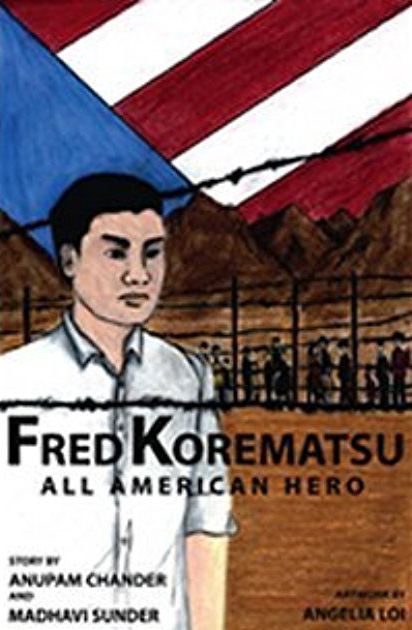Fred Korematsu: All American Hero (book)
Creators: Anupam Chander, Madhavi Sunder
Comic book by two University of California at Davis law professors that tells the story of exclusion challenger Fred Korematsu through the eyes of a young Muslim American girl in post-9/11 America.
Synopsis
The comic begins with Sheirin, a fifth grade girl from a Muslim family, whose unremarkable American childhood is transformed by the 9/11 terrorist attacks, which result in her becoming the target of bullies and even bigoted adults at her school. At a community Ramadan dinner, she is comforted by a Japanese American neighbor named Mari, who tells her about her experiences as a child who was incarcerated with her family during World War II. She goes on to tell Sheirin about Fred Korematsu from his life as an American teenager just prior to the war to his family's forced removal and incarceration, his decision to resist, his trials, postwar life and silence, and eventual vindication in the courts some forty years later. The book ends with Mari and Sheirin going to see Korematsu speak at local Sikh temple. The books ends with a timeline of events in Japanese American history.
The 96-page book was illustrated by Angelia Loi, then an undergraduate student at UC Davis.
Additional Information
The comic book came out of the effort to name an elementary school in Davis, California, after Korematsu, in which authors Anupam Chander and Madhavi Sunder—who were also a married couple who lived in Davis with their two children—were both active. Sunder was appointed to serve on the committee charged with naming the new school in 2005 and advocated for Korematsu, who had recently passed away. Chander's research revealed that Davis had been among the California cities that had passed a resolution that supported the mass removal of Japanese Americans and that called for the exiles to be prohibited from returning. Fred T. Korematsu Elementary School opened in August 2006. With the comic book, the couple sought to tell Korematsu's story in a medium that would reach children and to communicate that, as Sunder put it, "ordinary people can make a real difference in our country and in our community." Their project was supported by a grant from the California Civil Liberties Public Education Program. The authors held a competition to find an illustrator on the UC Davis campus, which Loi, than an undergraduate, won. [1]
Fred Korematsu: All American Hero is well-researched and is historically accurate for the most part, though it contains a few minor errors: cites 120,000 as the number of Japanese Americans removed from the West Coast and sent to "assembly centers" (page 28; the 120,000 figure includes all those who were in War Relocation Authority camps, including the 6,000 who were born in camp and other who arrived later; closer to 110,000 people went to the "assembly centers" or "reception centers"); has the 442nd Regimental Combat Team being formed in 1944 at the same time that Nisei draft eligibility is reinstated (58; the correct 1943 date for the 442nd is listed in the chronology); claims that "[m]ore than half [of those incarcerated] are children" (90; about 1/3 were children); claims the $20,000 reparations payments "amounted to $3.36 per day for a detainee who had been interned for two years" (94; $20,000 ÷ 730 days = $27.40 per day).
Footnotes
- ↑ Madhavi Sunder, "Why We Named a Davis School After Fred Korematsu," The Davis Vanguard , June 28, 2014, http://www.davisvanguard.org/2014/06/why-we-named-a-davis-school-after-fred-korematsu/ ; quote from "Insight 110127" [Radio program], Capital Public Radio, Jan. 27, 2011, http://archive2.capradio.org/157633 , both accessed on March 29, 2016.
Find in the Digital Library of Japanese American Incarceration
Fred Korematsu: All American Hero
This item has been made freely available in the Digital Library of Japanese American Incarceration , a collaborative project with Internet Archive .
Might also like
Fred Korematsu Speaks Up
by Laura Atkins and Stan Yogi;
Dear Miss Breed: True Stories of the Japanese American Incarceration During World War II and a Librarian Who Made a Difference
by Joanne Oppenheim;
The Internment of the Japanese
by Diane Yancey
| Author | Anupam Chander, Madhavi Sunder |
|---|---|
| Illustrator | Angelia Loi |
| Pages | 96 |
| Publication Date | 2011 |
For More Information
Fred Korematsu: All American Hero can be downloaded in PDF format through the Social Science Research Network at http://papers.ssrn.com/sol3/papers.cfm?abstract_id=2702601 .
